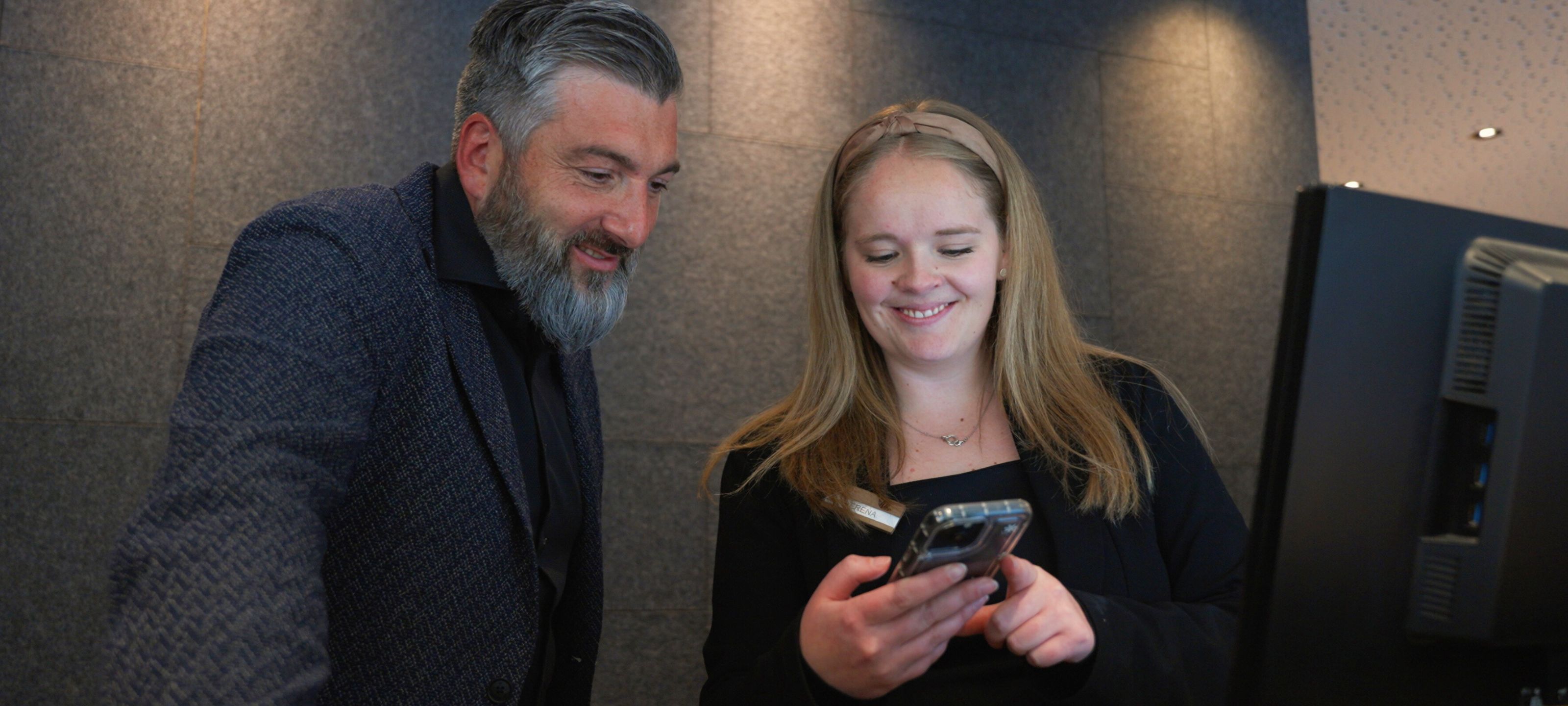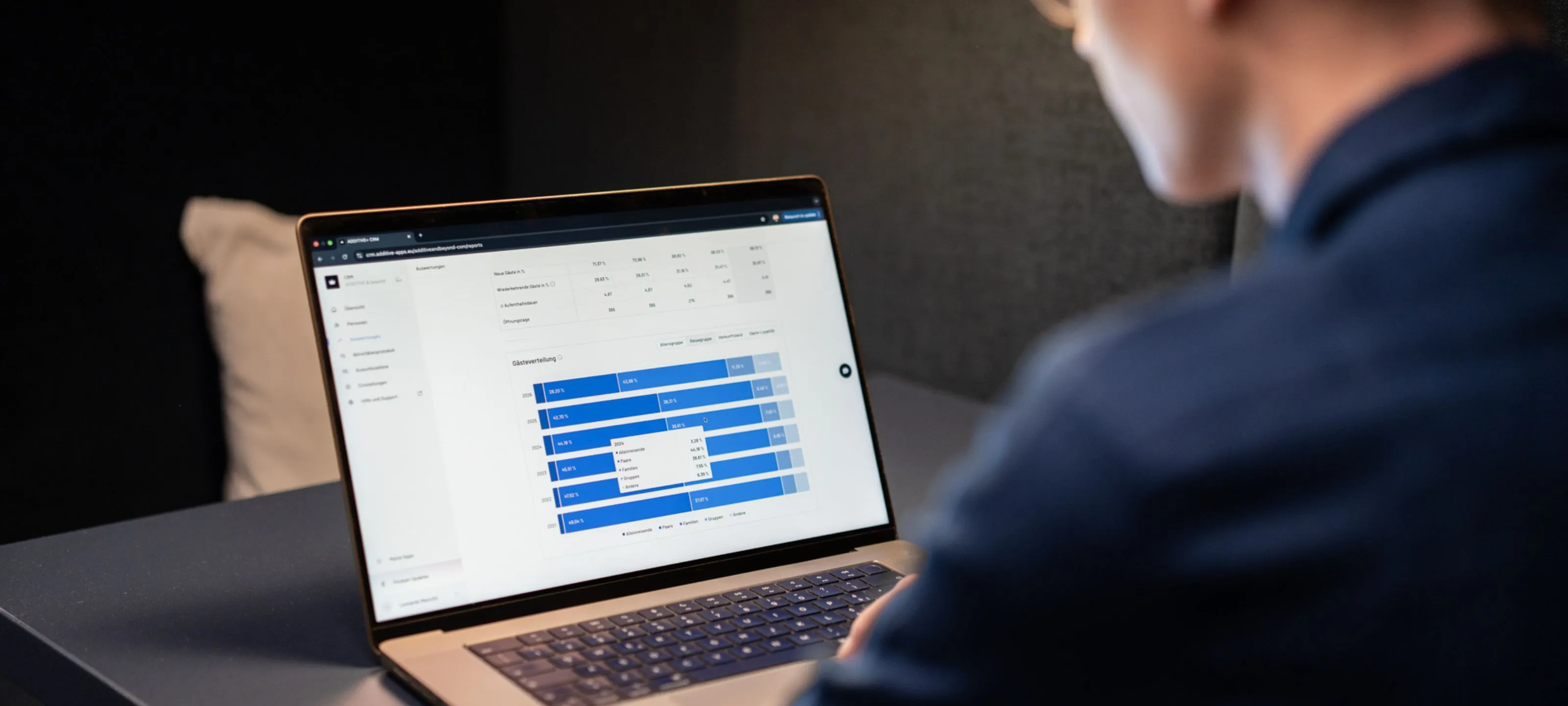
Digitization in the hotel industry: status quo, learnings & outlook

How digital is the hotel industry? This article analyzes the current state of digitalization, highlights insights from successful strategies, and provides an outlook on future developments in digital hotel marketing.
At first glance, the degree of digitalization in the hotel industry appears to be less advanced than in other industries, but it has brought disruption, especially in the areas of communication and sales. Digitization in the hotel industry is no longer limited to online bookings, online platforms and online marketing for hotels or the "e-marketing hotel" sector. Today's guest generations expect an excellent digital infrastructure combined with optimal comfort and service. Future generations, such as the Millennials and Generation Z, will have even higher expectations. In addition, operational process optimization and cost reduction in human resource management are just as important as technological developments in areas such as artificial intelligence, data management or marketing automation for hotels. The ubiquity of smartphones in all aspects of life also requires a closer look at digitization in the hospitality industry.
Preconditions & Topic Preparation
Basic requirements in the area of digitization, such as fast, smoothly functioning WLAN throughout the hotel, are not specifically addressed here. Instead, the topic of digitization will be presented along the customer journey, i.e. the digital touchpoints of the guest. It is important to note that all of the proposed solutions are technically feasible and available on the market today.
Inspiration Phase Digital Actions
The hotel guest's customer journey begins before the actual travel phase with the so-called pre-stay phase, which focuses on inspiration, information and booking. The level of digitalization of many hotels in the Alpine region seems to be well advanced: hotels without a web presence (own website, hotel social media) are the exception, multichannel storytelling has replaced pure information provision, and the search and booking options are diverse. The potential is still there. In online tourism marketing, or more specifically in online hotel marketing, especially in the area of storytelling, the guest can be increasingly inspired by the telling of emotional experiences and stories. The focus is on authenticity, and the stories and protagonists must fit the hotel's brand. In this way, the hotel can position itself clearly in the market and differentiate itself from comparable products through targeted hotel marketing.
Digital Experience in Hotels
The fact that the hotel industry in the Alpine region has not yet adapted to the digital self-image of the guest becomes apparent during the hotel stay itself. In the following paragraphs, possible initiatives for digital touchpoints will be highlighted in order to further optimize the guest's stay.
GUEST ARRIVAL
Other potential digital contact moments can be found in the hotel lobby: hotel chains such as Hilton and Marriott have been using concierge robots since 2016. On AIDA's cruise ships, the robot "Pepper" greets guests in several languages, answers questions about the day's itinerary or gives tips for excursions, and reserves spa appointments and restaurant tables.
With a slightly smaller investment, mobile digital concierges can be deployed: interactive information displays that can provide information about the hotel and the region, make reservations for a variety of ancillary services (restaurants, spa and beauty treatments, room service, hiking tours, events, taxis), and relieve front office staff.
The first digital initiatives can be implemented during the check-in process: Online check-in solutions via app or website eliminate the need for cumbersome formalities or handwritten forms. In addition, special user profiles (e.g. for regular guests) can be created to store the guest's special wishes. In addition to the receptionist, a self-service check-in or check-out is available.
IN HOTEL ROOMS
Once the guest has entered his or her hotel room, digital guest folders can be used on the guest's respective end device to provide information in the same way as smart TV solutions: in addition to hotel information, video-on-demand, personalized offers and room service through to streaming services. Guests can also control their hotel room via displays or a tablet: Lights, air conditioning, curtains, music, TV. As an alternative to tablets, voice control systems such as the "Alexa for Hospitality" hotel assistance software launched by Amazon in June 2018 can also take over all information and control tasks via voice command (from lighting mood to ordering extra towels).
The hotel room is another important touchpoint. Instead of a room key or keycard, the guest's own smartphone opens the door: the hotel sends the mobile key to the guest at the desired time, and it is automatically deleted when the guest checks out. This is done in encrypted form and with maximum data security. The guest is thus autonomous and independent of opening hours.
DURING THE STAY
During dinner in the restaurant, thanks to the use of a Customer Relation Management (CRM) or CRM Hotel, there are concrete digital application possibilities: The service employee greets the regular guest by name at the reception desk and informs him or her on the way to the table that a portion of his or her favorite dish is ready. The employee also makes other personalized recommendations and actively upsells. This requires continuously collected guest data that is stored in the hotel's CRM and presented in a structured way: This data comes both from the hotel software and from manual input by hotel employees.
GUEST DEPARTURE
On the day of departure, guests like to check out and pay with their own smartphone. At the same time, the stored door opener is deleted. When the guest leaves, housekeeping is automatically notified to clean the room immediately. The host or receptionist has time to say goodbye to the guest in the hotel lobby.
Book your Hotel Marketing Consultation:
15-Minute Expert Session - Free & without Obligation
- Exclusive one-on-one video call — free of charge, with no obligations
- In-depth assessment of your current digital marketing setup
- How to leverage guest data to drive direct revenue growth
- Proven strategies to boost occupancy and booking performance
Reflection Phase Digital Solutions
In addition to reputation management, some software solutions also offer loyalty and referral programs: with their own guest club program, guests collect loyalty points through their stay, hotel ratings or recommendations. The collected points can be converted into spa or value vouchers for the next stay, for example, using a suitable voucher app for hotels.
The customer journey comes full circle after the hotel stay with the reflection phase, which at the same time acts as an impulse generator for the inspiration and information phase of other potential guests. After check-out, an email inviting guests to rate their stay (via a rating portal, directly on the hotel's homepage, or on the hotel's own Facebook page) has become standard. These feedback and ratings, i.e. user-generated content, are important value indicators for potential guests during the inspiration phase. Effective reputation management with an automated monitoring tool should therefore be seen as an important part of hotel marketing or hotel web marketing.
In the months following the stay, the guest could receive targeted hotel newsletters (Christmas or birthday greetings) or special offers with a voucher option as part of targeted hotel email marketing, while also following the various social media channels of the hotel visited.
With all these measures in the reflection phase, the aim is to build loyalty and turn guests into regulars or brand ambassadors for the hotel. Today, good reputation management has a significant impact on a hotel's success.
Conclusion
The digitalization of the leisure hotel industry in the Alpine region is progressing, but is still limited to partial solutions. When implementing digital measures, each hotel needs an individual strategy that fits its own target group. A consulting process is helpful in advance to develop an individual digitalization model together with experts and to implement appropriate recommendations. There is no need to resort to costly custom development. In the meantime, there are ready-made solutions that can optimally support operations with individual adaptations, such as the marketing and sales solutions of ADDITIVE+ APPS in hotel marketing, especially when it comes to automating marketing for hotels.
And: modern digitalization does not exclude professional hospitality. On the contrary. If the hotelier uses the opportunities of digitalization correctly, he can increasingly respond to the individual needs of the guest and offer convincing, personalized service.







.jpg)

.jpg)



.webp)
